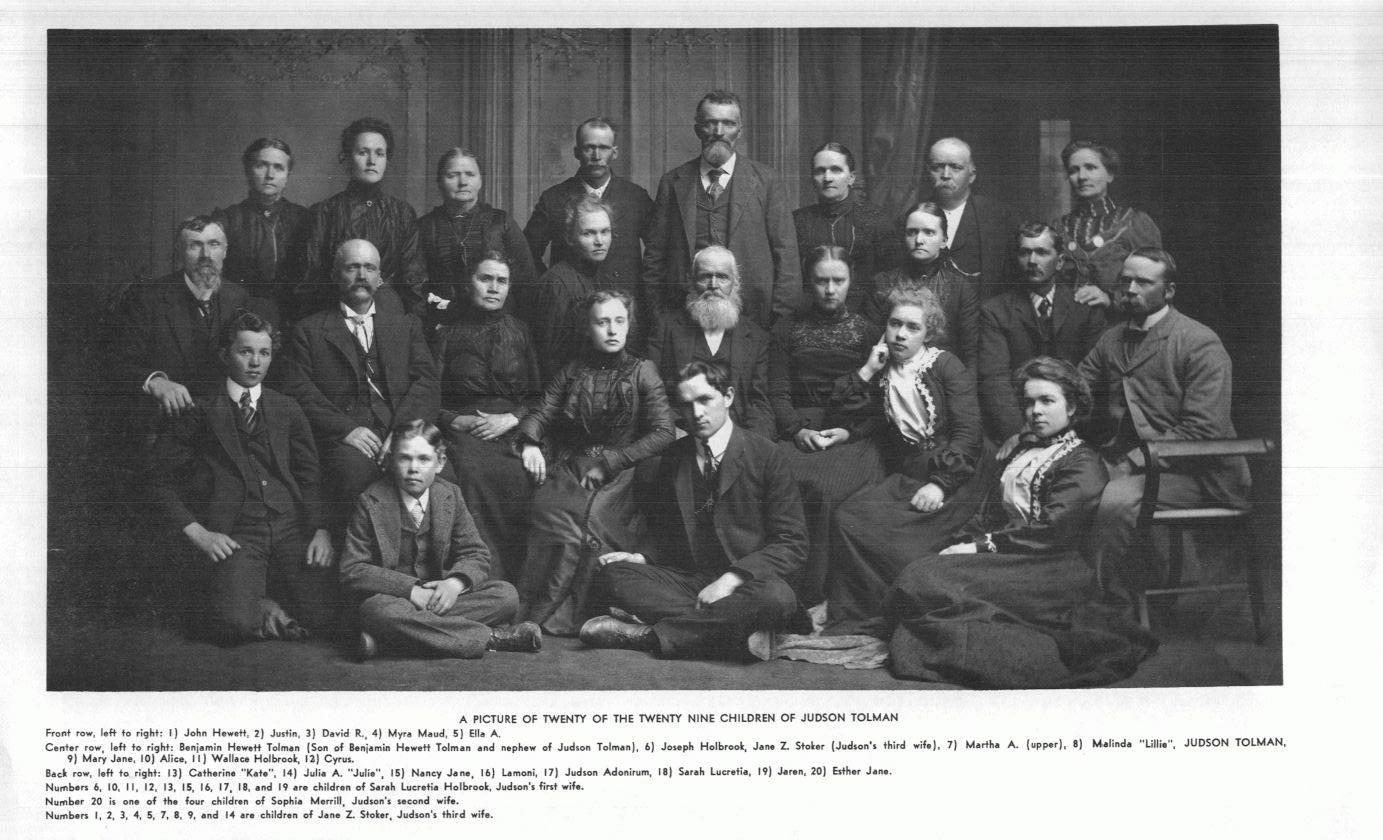When we consider the dual roles of patriarch that Judson Tolman filled, we should differentiate between, and consider both roles—first, that of patriarch to his eternal families, and second, that which is an ordained, ecclesiastical role of serving the saints in the Davis Stake of Zion.
From the teachings of Ezra Taft Benson we read: “For a man, there is no calling as high as that of a righteous patriarch, married in the House of the Lord, presiding over his children.” (Teachings of Ezra Taft Benson, page 496.)
Further insight into this patriarchal office is provided by Elder Bruce R. McConkie:
From Adam to Noah the presiding representative of the Lord on earth held the office of patriarch and high priest—a calling conferred successively from father to son. Similar rights were held by Abraham, Isaac, Jacob and others of the patriarchs in their respective days. Abraham was promised that from his day on all who received the gospel would be accounted his seed and that his descendants after him would have right, by lineage, to the same priesthood he had gained. (Abraham 2:6-11) Certain righteous persons were thus destined to receive the priesthood because they were “lawful heirs according to the flesh.” (D&C 86:8-10) It was their birthright. Special birthright blessings and priesthood pre-eminence have remained in the lineage of Jacob. Reuben, his firstborn, lost the birthright because of iniquity, and it passed to Joseph (I Chron 5:12) and through him to Ephraim. “I am a father to Israel,” the Lord said, “and Ephraim is my firstborn.” (Jer 3:19) This preferential status enjoyed by Ephraim among his fellow tribes in Israel has continued to our day. Predominantly Ephraim, among all the tribes of Israel, has so far been gathered into the fold of the true Shepherd. (McConkie, Bruce R., Mormon Doctrine, page 87).
“It is common to speak of the Latter-day Saint home, meaning not just the dwelling place of the family, but the family institution itself. This usage considers a Mormon home to be one bound together for eternity by the sealing power of the priesthood; one in which love abounds because all members of the family believe and obey the gospel law; one in which the father holds the priesthood, blesses his wife and children, and stands as a true patriarch to his posterity.” (McConkie, Bruce R., Mormon Doctrine, page 362.)
Let us first consider Judson Tolman in his role of “family” patriarch, husband, father, grandfather and brother…
We have already given considerable attention to the marriage of Judson Tolman and Sarah Lucretia Holbrook. By the time we reach Tooele with them, between the years of 1849 and 1854, when they relocate to Bountiful permanently, major changes had begun in this patriarchal unit.
In 1852, while still living in Tooele, Judson entered into the practice of plural marriage. His second wife, was Mary Reeves Coleman. Mary was the widow of George Coleman who had lost his life in the Mormon Battalion. Of Judson’s and Mary’s lives together we know very little. No record of children has been found. There is a church record that the marriage was cancelled on the 26th of January, 1857. But beyond this, no information has been uncovered. This relationship is one of interest, but hardly of speculation.
On February 5, 1856, two years after arriving in Bountiful, Judson married Sophia Merrell. There is some question as to the long-term compatibility of their union. They had four children — Samuel R. (born September 17, 1858), Esther Jane (born February 12, 1863), Charles Nathan (born June 18, 1865), and Sarah Elvira (born March 29, 1868). LDS Church records indicate that all four of these children were born in the covenant. In 1869, Sophia left the home in Bountiful and moved to Plymouth, Cache County, Utah. Her sealing to Judson Tolman was cancelled by the church in 1869 and again in 1874. No reason for the cancellation is stated. Sophia remarried Garret Hopkins Wolverton. She died in childbirth in 1875.
Stake patriarchs are chosen pursuant to the following revelation: “It is the duty of the Twelve, in all large branches of the Church, to ordain evangelical ministers, as they shall be designated unto them by revelation.” (D&C 107:39)
June 13, 1897: Judson Tolman ordained to the office of Patriarch by President Joseph F. Smith. (Davis Stake, Manuscript Histories, Salt Lake City, The Church of Jesus Christ of Latter-day Saints Historical Department.)
Frank D. Ashdown, who was born in Bountiful in 1887, was asked, as part of his oral history “Who were some of the Church leaders in early Bountiful who made impressions on you as a boy?” He had this to say about Judson Tolman and the Davis Stake Patriarchs: “I remember the patriarchs because they spoke in tongues nearly every fast Sunday, and somebody got up and interpreted. I can remember that very well and I’ve heard them many times. One of them was Judson Tolman, and another was patriarch (Edwin) Pace. Also there was Alma Kynaston.”
Those years must have been especially full of manifestations of the spirit. Speaking in tongues was a consistent experience, especially among the patriarchs. In addition, as the excerpts from the History of Thomas Briggs clearly document, these same patriarchs were involved in regular “cottage meetings” in which they dedicated the homes of the saints as a means of consecrating them to the Lord and protecting them from the adversary. The number of times that such events were recorded and the traveling of the patriarchs to perform the dedicatory services suggest that, perhaps, there was a regular program throughout the Church and that the patriarchs were assigned to the work, in addition to their assignment of bestowing patriarchal blessings on the saints.
Lucile Tolman Knighton, Judson’s grand-daughter, remembers that “Aunt Myra” (Elmyra Tolman Patterson), one of the youngest children of Judson and Zibiah Jane Stoker, served as scribe for most, if not all, of the patriarchal blessings that Judson gave.
Quoting from Aunt Myra Tolman Patterson we read:
“When I was about fifteen years old, my father was ordained a patriarch, I use to write his blessings for him. I wrote over three thousand blessings over three times, wrote them down, recorded them, and a copy for the person it was given to. I remember my father said that was all I had to do, so I got out of a good many tasks which I should have had…
“I accompanied my father with three other Patriarchs and Apostle John W. Taylor as they went through Davis County dedicating homes. I have seen many miracles performed. At one time, at night they were holding a meeting in the Bountiful Ward Chapel, two of the patriarchs spoke in Tongues and my father interpreted them, a light shone on the meeting house as bright as the noonday sun. They were dedicating a home in Centerville. I think it was Brother Horsley’s, he had been deaf for fifteen years, Brother Pace spoke in tongues and laid his hands on his head, my father interpreted the tongues and told him he should receive his hearing and he did instantly, many more miracles were performed by these faithful men of God, while I was with them.” (Biographical sketch written by Elmyra (Myra) Tolman Patterson. Familv Book of Remembrance and Genealogy, compiled and published by DeVon Mecham, 1952, page 543.)
Myra further testified, “I have witnessed may marvelous things which came to pass through those blessings.” Family folklore [oral history] also tells us that Aunt Myra received an unusual gift of shorthand, which enabled her to record the lengthy, eloquent blessings that were trademarks of Patriarch Judson Tolman. Patriarch Arlin Mecham, a great grandson of Judson Tolman had the privilege of reviewing the Judson Tolman Patriarchal Blessings File as part of his training as a Patriarch. His impression is that Judson was exceptionally well versed in the doctrine of the Church and that his blessings were unusual in their detail and eloquence. (See Appendix II where transcripts of three patriarchal blessings that were given by Judson Tolman are reprinted.)
After years of searching for a journal for Judson Tolman, as a family, we have come to believe that it may have been part of the vast genealogical records that Aunt Myra accumulated. Many of them were stored in boxed at her home and suffered water damage. They were discarded because of that damage, and it is possible that Judson’s journal was destroyed with them.
(Contributed by the Thomas Tolman Family Organization. Excerpt from Judson Tolman: Pioneer, Lumberman, Patriarch by E. Dennis Tolman, Second Edition, 2004, pages 51-53, 64-67.)


